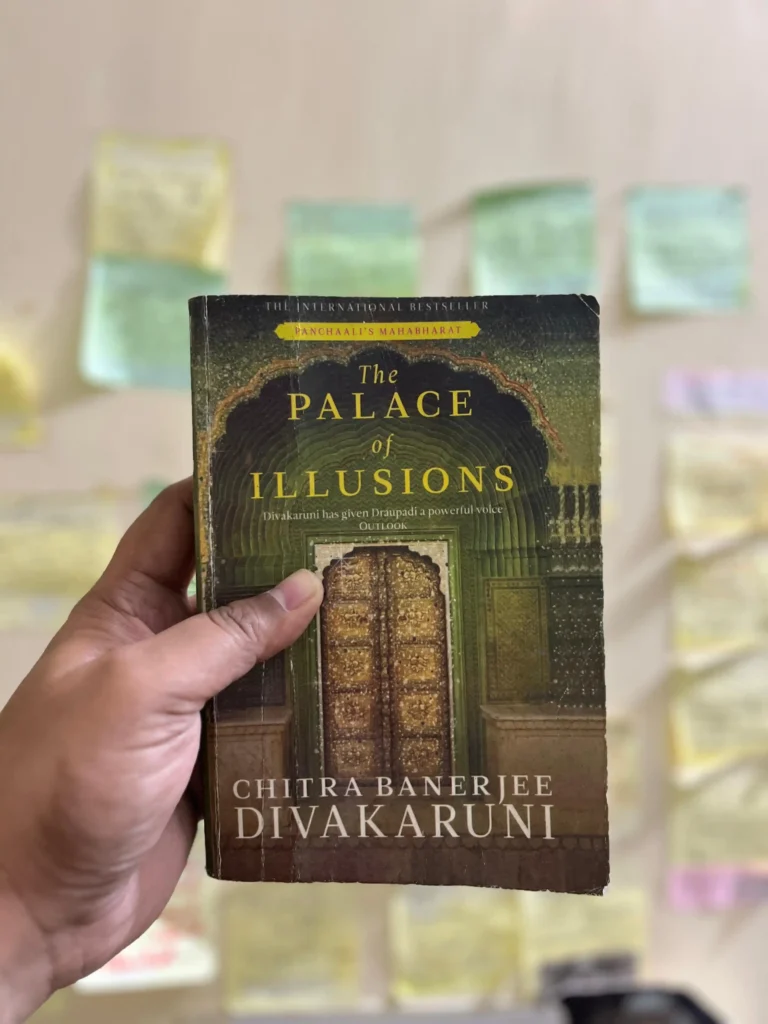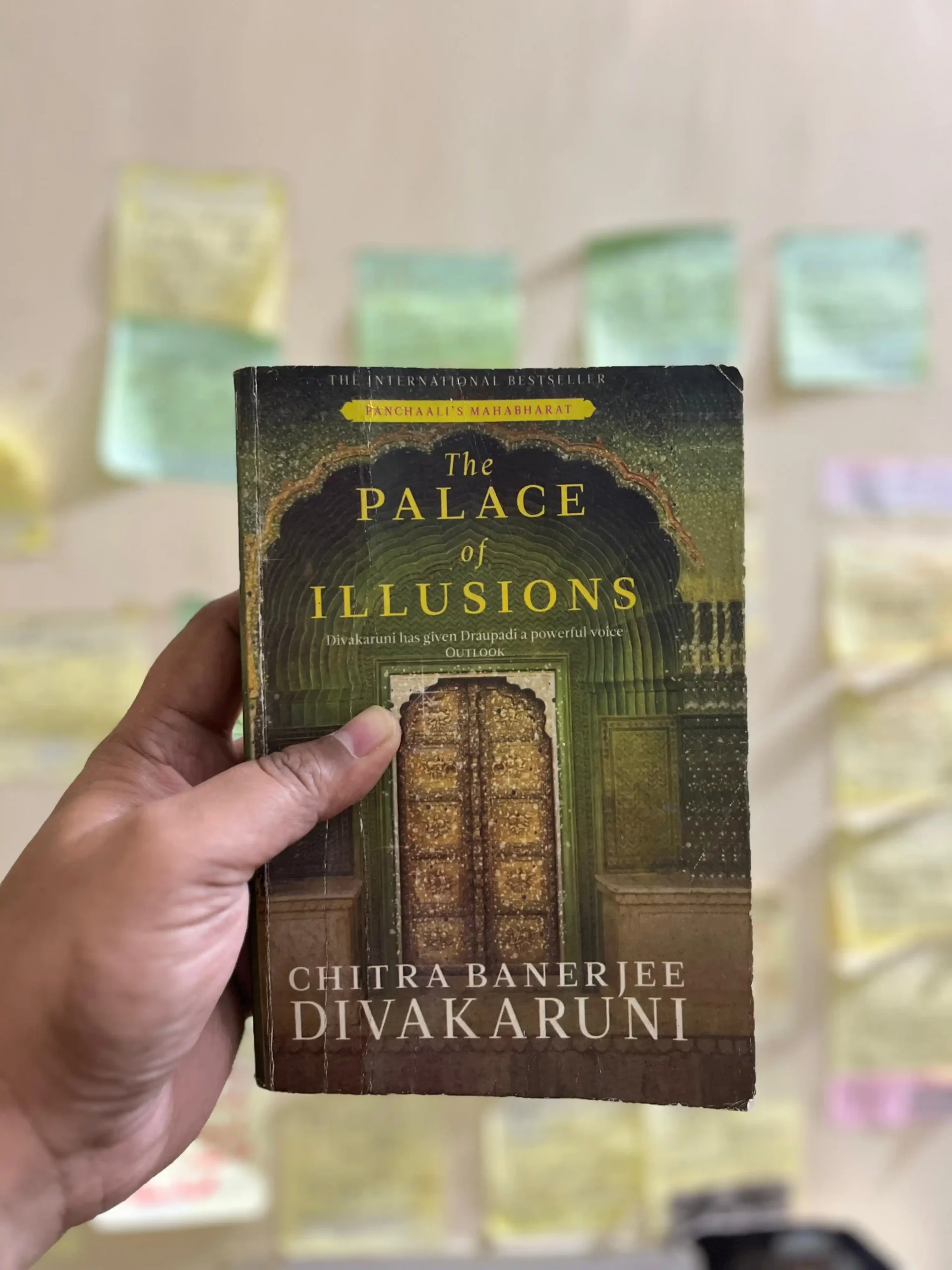
Revisiting Draupadi’s Fireborne Voice in Chitra Banerjee Divakaruni’s The Palace of Illusions.
In a land where memory often arrives in the form of myth, and myth slips gently into the skin of history, Chitra Banerjee Divakaruni dares to ask: what if Draupadi had told her story?
Not the story the bards sang beside flickering lamps or what the rishis etched into palm leaves—but the quiet, enraged, sensuous, and restless voice of the woman herself: Panchaali, fire-born, fate-bound, yet stubbornly alive in her own longing.
The Palace of Illusions is not just a reimagining of the Mahabharata—it is a reclamation.
Told in first-person, the novel gives us Panchaali not as a character moving through epic events but as a woman living within them, breathing them in, often choking, sometimes rising, and occasionally dreaming of a different ending.
⸻
A Palace Built with Ashes and Memory
At the heart of this luminous novel is the palace itself—the Maya Sabha. Born of illusion, the palace is shaped from magic and ambition, shimmering with grandeur yet hollow with destiny’s echo.
It is built for Panchaali, yes, but also around her: a symbol of splendour, of power newly claimed, of a woman whose world is as fragile as the glass floor that deceives Duryodhana into tumbling—setting history on fire.
But this palace is no home. It is a mirror. And every mirror, Divakaruni reminds us, knows how to lie.
Through Panchaali’s eyes, the palace becomes a metaphor for what it means to be seen but not known, desired but not heard, revered yet restrained.
“They called me queen,” she muses, “but they never asked me if I wanted the crown.”
Such sentences, at once lyrical and piercing, define the voice Divakaruni gives her protagonist: one that knows how to wound without rage and weep without noise.
⸻
The Voice of a Woman, Not a Goddess
There is something audacious—and deliciously dangerous—about giving voice to Draupadi.
For generations, her story was one of consequence, not consciousness. Her five marriages were political markers.
Her humiliation, the pivot of war. Her desires, silenced under the weight of dharma.
But Divakaruni, with a novelist’s intuition and a poet’s ear, reimagines Draupadi as Panchaali, a girl who speaks back, who questions prophecy, who flirts with Karna in her mind while walking beside Arjuna in exile.
Who is jealous of Kunti. Who is tender with Bhim. Who finds her truest self not in marriage but in the philosophical banter shared with Krishna, her only equal in a world full of men with swords and shadows.
This voice is what makes the novel sing. Not because it is perfect, but because it is flawed.
Impatient.
Proud.
Sometimes manipulative.
Often raw.
Always honest.
It is a voice that might have whispered through generations of women across our land—those who stood behind curtains, who loved in silence, who bore the burden of honour, who never asked to be born from fire.
⸻
Karṇā: The Flame She Could Not Touch
In perhaps the most controversial but poignant strand of the novel, Divakaruni imagines a secret longing between Panchaali and Karna.
It is an imagined thread, yes, but one that feels inevitable in the emotional fabric Divakaruni weaves.
Karna, the forsaken prince, mirrors Panchaali in his pain both cursed by birth, both warriors of dignity, both denied love in the currency they longed for.
That Panchaali dreams of him even as her husbands win kingdoms is not scandalous; it is human.
That she regrets never knowing him beyond the battlefield is not betrayal; it is longing.
This imagined intimacy does what good fiction must, it unsettles our moral neatness.
It opens up the silences in epics and reminds us that sometimes the most powerful relationships are the ones that never found words.
⸻
More Than a Retelling: A Reframing
Too often, women in mythology are remembered for what was done to them, not what they did.
Divakaruni turns that narrative on its head.
She does not erase Panchaali’s suffering, but she unpacks it.
She does not grant her heroism in the masculine sense but gives her something more enduring: agency. Panchaali chooses to speak. To remember.
To love and hate and demand and forgive.
She navigates exile not just of geography but of voice, and she returns not as a vengeful queen but as a storyteller who has walked through fire twice, once at birth, and again through life.
This is not a book about the war. It is a book about the woman who walked through its smoke, barefoot, and came out on the other side still asking, “What of me?”
⸻
Between Divinity and Desire
Divakaruni writes with the surefooted grace of someone who knows that beauty and brutality live side by side in myth.
Her prose shimmers—sometimes lush as a sari’s silk, sometimes stark as battlefield dust.
She slows down when she must—“Panchaali,” she writes, “was my name. But the world called me by many others, some tender, some cruel”—and then quickens with the pulse of approaching war or the tremble of a forbidden glance.
What Anita Desai does with memory and monsoon, what William Dalrymple does with ruins and rivers, Divakaruni does with myth. She finds the woman in the legend and then lets her live.
⸻
What Remains After the War
There is a scene late in the novel, quiet, almost translucent—where Panchaali stands at the edge of death, having watched kingdoms rise and fall, husbands wither, sons vanish into ash. She wonders, not for the first time, whether it was all worth it.
It is in this moment that the palace reappears—not in stone, but in memory. The illusion was never in the marble. It was in the belief that grandeur could shield one from grief.
And yet, there is grace in this ending. Panchaali, like all women who have lost and loved and endured, walks into her afterlife not as a shadow of men’s stories, but as the teller of her own.
⸻
Final Reflections: A Mirror to Our Myths
The Palace of Illusions is not merely a novel. It is a mirror held up to our oldest stories—and to ourselves. It asks what it means to be remembered. And by whom.
In classrooms and temples, we will still hear Draupadi’s name recited.
But in bedrooms and balconies, in diaries and dreams, it is Panchaali we will remember—the girl who wanted more than fate allowed, the queen who never asked for five husbands, the woman who loved Karna in secret and Krishna in soul, the voice who dared to say: “I was more than a wife. I was more than war.”
And for those of us reading her story, perhaps the greatest illusion to let go of is this: that epics belong only to men with bows and boons.
Sometimes, they belong to a girl who was born of fire—and who finally got to speak.
⸻
Verdict:
A must-read for those who believe myths are more than marble. And for every woman who ever wondered what it would sound like if the heroine finally had the last word.
